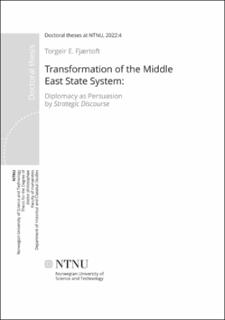| dc.contributor.author | Fjærtoft, Torgeir E. | |
| dc.date.accessioned | 2022-01-20T09:51:36Z | |
| dc.date.available | 2022-01-20T09:51:36Z | |
| dc.date.issued | 2022 | |
| dc.identifier.isbn | 978-82-326-6742-0 | |
| dc.identifier.issn | 2703-8084 | |
| dc.identifier.uri | https://hdl.handle.net/11250/2838429 | |
| dc.description.abstract | EU, and Norwegian, foreign policy in a number of important conflicts fails to produce intended effects but seems to have grave unintended consequences and prohibitive collateral costs. Policy infers from a set of assumptions that form a theory and then a model. Policy fails when the theory is wrong. In any comparable field, including financial policy, failure would prompt research into the causes of the malfunction to find actionable theories that may produce more intended effects.
This dissertation develops an actionable theory on diplomatic intervention by strategic discourse, applying theories of cognition and emotion. The theory of strategic discourse posits that foreign policy decisions are shaped by historical analogies. Managing emotions in intergroup processes enables introducing alternative analogies that by persistent reiteration over time will influence in the intended direction perceptions of options. The theory of strategic discourse is applied to policy interventions in the current epicenter of world conflict, the state system formed by the remaining major stable states in the Middle East, Saudi Arabia, Iran, Turkey, and Israel.
The theory evolved by abductive reasoning in the course of a series of encounters. Testing was possible by presentations in the Middle East to two different audiences comprising parties to the regional conflicts, primarily Syria. The observations in the testing reinforced the theory.
In five peer-reviewed articles published in level one journals, submitted for the dissertation, the theory of strategic discourse is applied to design policy interventions in the Middle East state system. | en_US |
| dc.language.iso | eng | en_US |
| dc.publisher | NTNU | en_US |
| dc.relation.ispartofseries | Doctoral theses at NTNU;2022:4 | |
| dc.relation.haspart | Paper 1: Fjærtoft, Torgeir E. Envision, Not Argue: Innovating EU Policy After the Failures of Libya and Syria. European Foreign Affairs Review, Volume 25, Issue 1 (2020) pp. 61 – 78. Reprinted from with permission of Kluwer Law International.” | en_US |
| dc.relation.haspart | Paper 2: Fjærtoft, Torgeir E. ‘Making the Gulf Cooperation Council the EU of the Middle East’. European Foreign Affairs Review 23, no. 4 (2018): 485–504. Reprinted from with permission of Kluwer Law International.” | en_US |
| dc.relation.haspart | Paper 3: Fjærtoft, Torgeir E. The Saudi Arabian Revolution: How Can It Succeed? Middle East Policy, Volume25, Issue3 Fall 2018: 131-142. | en_US |
| dc.relation.haspart | Paper 4: Fjærtoft, Torgeir E. ‘Engaging the US in the Age of Trump: The Case for a New European Strategic Discourse’. European Foreign Affairs Review 24, no. 1 (2019): 7–26. Reprinted from with permission of Kluwer Law International.” | en_US |
| dc.relation.haspart | Paper 5: Fjærtoft, Torgeir E. From the Fall of the Berlin Wall to the Fall of Aleppo. The Decline of Global Governance ? and How to Restore it. Global Policy 2019 | en_US |
| dc.title | Transformation of the Middle East State System: Diplomacy as Persuasion by Strategic Discourse | en_US |
| dc.type | Doctoral thesis | en_US |
| dc.subject.nsi | VDP::Humaniora: 000::Historie: 070 | en_US |
